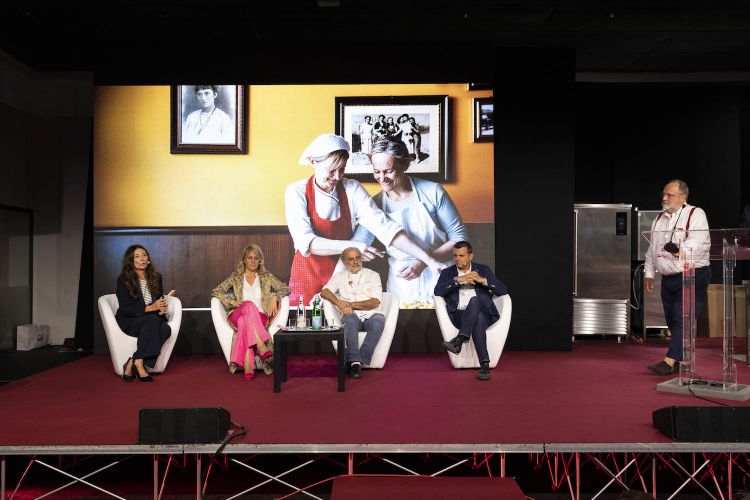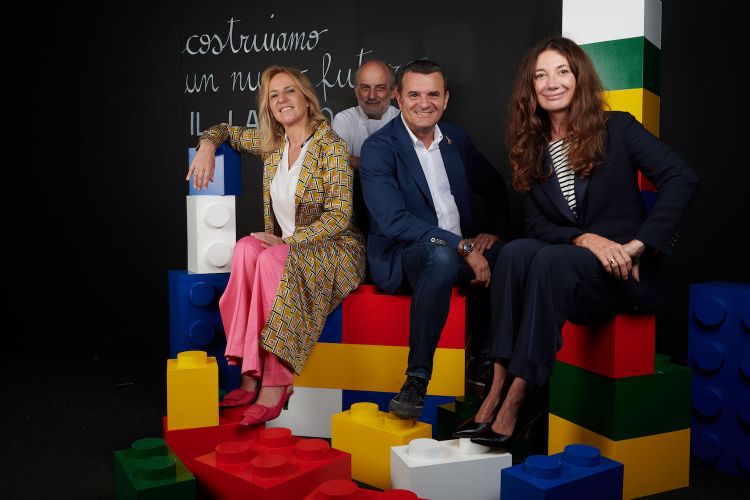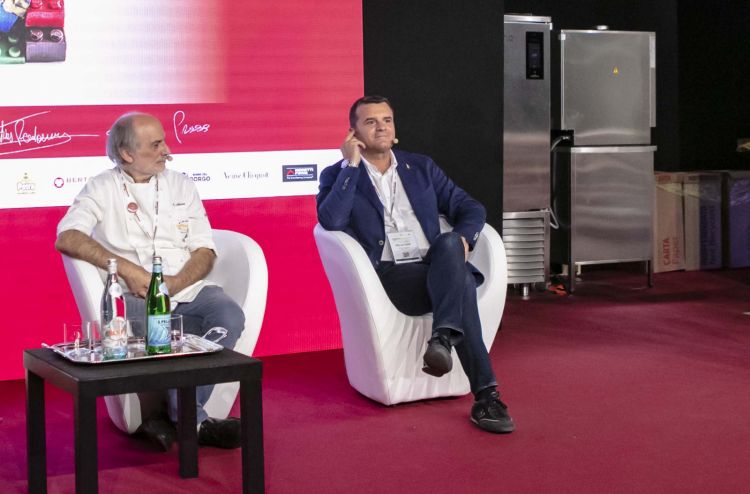On the 11th of October another step was made so that what was once a dream can become reality. On Monday, the official candidacy request was made, so that Italian cuisine can be included in the Unesco World Heritage list as an immaterial heritage. An idea launched some time ago by Maddalena Fossati, director at La Cucina Italiana («It's a challenge. It won't be easy. Everyone told me so. But difficult tasks don't scare me», she told us here, back in July, last year) and which gradually took shape. With the involvement of thousands of supporters. It has received important endorsements. Back in January it equipped itself with a prestigious scientific committee, directed by professor Massimo Montanari. They started to curate a rich dossier. The goal now is to present it officially during the next session at Unesco, which is scheduled in March 2022. «Let's hope we can make it».

With Paolo Marchi, the speakers at the congress: left to right Maddalena Fossati, Roberta Garibaldi, Corrado Assenza, Gian Marco Centinaio. Photos from Brambilla-Serrani
offered the perfect chance for a status update on the candidacy, which has both private and public entities, businesses and culture, prominent figures and associations join forces. "Working as a team" we always say. A further news: as in another meeting that took place within the congress (see:
At Identità Milano the government is committed to support restaurants. They called a Meeting for the 6th of October), politicians and institutions at last have noticed the importance of the food and wine industry. After ignoring it for a long time, it seems they are going to support us.
This is a big satisfaction for
Maddalena Fossati, who on the stage of
Identità Milano explained: «Having people understand the value of Italian cuisine has been my goal ever since I took the helm of my historic magazine. Food is a crucial identity value and the acknowledgement of Italian cuisine as an immaterial Unesco heritage I believe can become a crucial turning point. We have created a large project of aggregation in this venture, having players who wouldn't usually talk to each other sit around the same table – or rather join on Zoom. In other words, little by little we've built, and we are building the famous "teamwork", creating strategic allegiances. This is a match in which we're all playing together. Grandmas and chefs».
Corrado Assenza was sitting beside her, on the stage of Identità Milano. He told an anecdote, starting from his personal experience (he was one of the protagonists of Chef's Table su Netflix, acquiring global fame), to point out the power of Italian food and wine:
«A while back, in August, I was in the workshop of my pastry shop in Noto, which overlooks a steep slope. I was trying out a new biscuit dough. I see through the open door two tourists plodding in the heat. They were American; they were climbing the long road to my shop. They got closer to the door of the workshop; I greeted them and pulled out of the oven some biscuits, telling them I was trying to improve them. They tasted them and said: «To us they're already perfect. But in Italy you always think food can be improved, that's why you're the best». They had come to Noto from the United States specifically to visit Caffè Sicilia. And there was also a couple from Vietnam: they took a plane from Hanoi, transferred in Moscow and landed in Rome and then they rented a car to get to Noto, to spend two nights and taste all they could of my production and then go back. Just think of the connected economy that is nourished by these incredible situations!»
The Unesco acknowledgement - Assenza explained – can be a very important step, «especially if the right importance is given to the professionals who are working to make the Italian food culture more and more current: because today's cassata is not the one from 1000 years ago, of course, and people continue to like it because it's current and it's made with excellent raw materials. As an ambassador of Italian taste, I feel responsible to do as much as I can, to be myself in the best possible way. To take positive actions. To say all I do and think on the Italian food production system, in a journey that includes the recovery of the inland where there is a strong, well-spread and innovated food culture. Besides, this recovery of small villages has very important social, economic, cultural and environmental impacts too: it fights people leaving these places, it promotes the importance of looking after one's territory which means preventing wildfires and natural disasters». A bright conclusion: «Restaurants can change society».

Roberta Garibaldi, Corrado Assenza, Gian Marco Centinaio, Maddalena Fossati
, university professor, ministerial advisor for food and wine tourism and member of the scientific committee for the Unesco candidacy of Italian cuisine: «These complex times have in fact strengthened the role of wine and food in the tourism market. In 2016 "only" 21% of tourists considered wine and food as the crucial element in their choice of destination. It is now 55%. It's a varied market, that includes both local food and gourmet food, but also "different experiences", like tours of wineries, dairy farms and olive oil farms...» In general there's a desire for novelty, the ideal destination is the one that joins "innovation" and "authenticity". «For sure every tourist seeks excellence: of landscapes and flavours, hence the good and the beautiful», this is why our country has a significant competitive advantage. «This also applies to foreigners in Italy, but also to Italians who are discovering our peninsula more and more. Investing on wine and food tourism therefore means catching this opportunity for growth in both trends».
Since 2010 the "gastronomic meal of the French" is the only form of cuisine included in the Unesco list. In Italy, the UN organisation has acknowledged as many as eight entities connected with food: Mediterranean Diet, as a “transnational” element (2013); the head-trained bush vine in Pantelleria (2014); the Art of the Neapolitan "pizzaiuolo" (2017); and then the Wine Landscape of Piedmont: Langhe-Roero and Monferrato (2014); the Hills of Prosecco di Conegliano e Valdobbiadene (2019); and finally the "Creative cities of gastronomy", an acknowledgment obtained by Alba, Bergamo and Parma. But do these laurels produce tangible positive effects? Roberta Garibaldi: «Let's say that the process of candidacy itself is already virtuous, as it stimulates the adoption of new projects. In case of success, the impact is always useful. How much so? It depends on the role we give to it».

Corrado Assenza, Gian Marco Centinaio
As we said, the candidacy of Italian cuisine is supported by the institutions. On the stage of
Identità Milano, debating with
Fossati, Garibaldi and
Assenza there was also
Gian Marco Centinaio, undersecretary at the Ministry of Agricultural Policies, of which he was minister under the first Conte presidency. And he gave an anecdote:
«As a minister, I went to China to meet my Chinese counterpart. The theme: importing Italian excellences in the country. He said: "When the French come, they bring us Beaujolais, and build a beautiful storytelling around it – the wine producer, the winery, the landscape... – and they sell it as if it were an extraordinary wine. Then you Italians come: on Monday I talk with a Region, on Tuesday with the Tourism Organization; on Wednesday with a Minister, on Thursday with the Chambers of Commerce, on Friday with ITA; on Saturday with another Minister. And then on Sunday a private company arrives and ensures me that all the people I've talked to before are incompetent". So, in conclusion, the Chinese said , "you're a ragtime army"».
Centinaio invites everyone to work as a team: «Too often we give what we have for granted. We're the most envied country in the world, as shown by the 100 billion of euros that Italian sounding generates each year. But we cannot rest on the laurels, because the world moves on, competitors increase and we need to think differently compared to what we've done so far. We need to work as a network, nationally, joining our efforts, putting together institutions and private enterprise to promote and safeguard Italian cuisine». Fossati and Centinaio agree: any acknowledgement from Unesco «would be a victory but not a point of arrival». Centinaio: «We need to create a technical-political discussion where the players in this industry can discuss and understand needs, and find answers. Which ones? We create the shell, and then we fill it with content».
Translated into English by Slawka G. Scarso